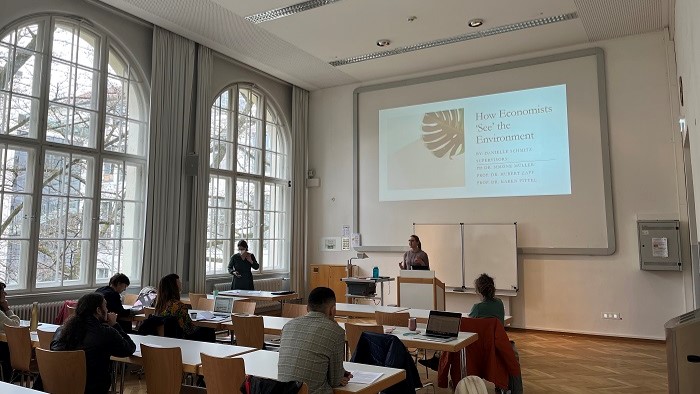Col­lo­qui­um of the Inter­na­tional Doc­toral Pro­gram “Re­think­ing Envi­ron­ment”
In the first Colloquium of the International Doctoral Program “Rethinking Environment”, 20 PhD students and program advisors gathered at LMU Munich and Augsburg University to discuss research projects. The 3-day event was a great opportunity to learn about the projects, discuss key topics in Environmental Humanities and related disciplines, and most importantly to meet as a community.
Before the event started on Wednesday, March 30, the PhD students met for a joint breakfast, in which they had the opportunity to come together informally and talk as an “ice-breaker” activity. Following up with the program, they met with advisors to start the academic session, introduced by one of the Program’s speakers, Prof. Dr. Simone Müller. The day was planned for a total of six presentations with short introductions by the students’ advisors. In the morning, Danielle Schmitz and Livia Cahn discussed topics such as discourse, archives and representation within the disciplines of environmental economics, philosophy, anthropology, and landscape studies.

After a lunch break, the group joined again for the next round of presentations, learning about the projects of PhD students Jasmijn Visser and Floris Winckel, who dealt with conflict, visualization, and technology themes in the arts and history of science. The first day of the colloquium ended with projects in philosophy, ethics, economics, and urban planning, by Felix Treutner and Lukas Emrich, who talked about communities, capitalism, and liberalism.
Lectures at both locations of the doctoral program
The International Doctorate Program “Rethinking Environment” is a cooperation between the University of Augsburg and LMU Munich. It was therefore logical that, on the second day, the colloquium took place at the Environmental Science Center in Augsburg, with a morning introduction by Prof. Dr. Kirsten Twelbeck, coordinator and advisor in the doctorate program. Anne-Sophie Balzer and Lucia Medici opened the session with their ecocriticism projects, followed by Laura Fumagalli’s project in environmental ethics, aesthetics, and philosophy of art. Landscapes were the underlying theme behind the three projects, with specific focuses on poetry, narrative, anthropocene, conflict, and environmental impacts.
On this busy day (with a total of six presentations), the group continued sessions after a lunch break at the university’s dining hall. Fizza Batool and Daler Kaziev talked about their research on sociology and political ecology, emphasizing aspects of environmental justice and development narratives in Asian countries. Christian Schnurr closed the second day by debating environmental discourses within philosophy, science and technology studies frameworks.
Munich was again the colloquium host on the final day of presentations, with two sessions. Lakshmi Dilipkumar and Christopher Klapperich brought topics in anthropology, literature, and political ecology in the Global South. In the last round of sessions, the group was introduced to environment and technology narratives within sustainability studies, ethics, and philosophy by students Pia Wimmer and Maximilian Pieper. Closing the event, the students celebrated together during an informal lunch.
An enriching and formative event, the colloquium gave PhD students the chance to practice and demonstrate their research and science communication skills. Furthermore, it certainly advanced academic debates on environmental humanities topics through engaging discussions and supportive feedback from advisors. The students of the doctorate program reported to have felt inspired by the discussions and to have had very positive impressions of the colloquium.
Text: Talitta Reitz (RCC Munich) and Kirsten Twelbeck (Environmental Science Center Augsburg)

